Playing Gwent
If you have past experience in playing collectible card games then learning how to play Gwent will actually not be much of a challenge for you - but if you don't the following information may help...
As noted, Gwent is a collectible card game that you can play with NPCs in the game.
Basically the game consists of two players whose armies face off against each other on the playing field - or in this case the board - and who are represented by different cards that have different abilities that in theory, and if played correctly, will allow one player to gain an advantage over the other.
These first games in White Orchard Village are actually rather easy - by design - and start with the Gwent Tutorial.
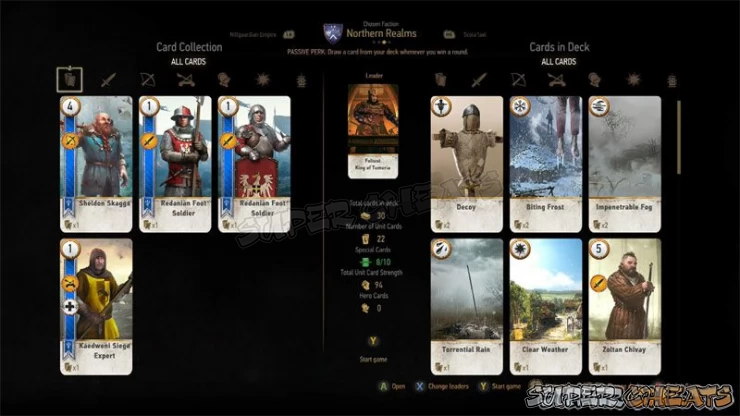
The Rules of Gwent
At the start of the match you flip a coin to see what player goes first - and then each player gets 10 random Gwent cards drawn from their deck. Other than limited exchange of 2 cards once per match, what you draw is what you get.
Once the match begins the players place a card on the board - or pass if they want - with each type of card going in the row that is appropriate for it. Normally you can only place one card per turn, but if you have a special ability card that permits the placement of more than one, you can do so.
In addition to the troop and ability cards there are weather cards that can impact the battlefield by boosting the ability of certain cards.
Each unit card has a Strength Point amount and all of them are added up on each side.
To win a round of Gwent you must have more points on the board than the other player.
The round concludes when either both players no longer have cards or one person decides to pass on his or her turn and the other player has more points.
The player who wins two out of three rounds wins the match
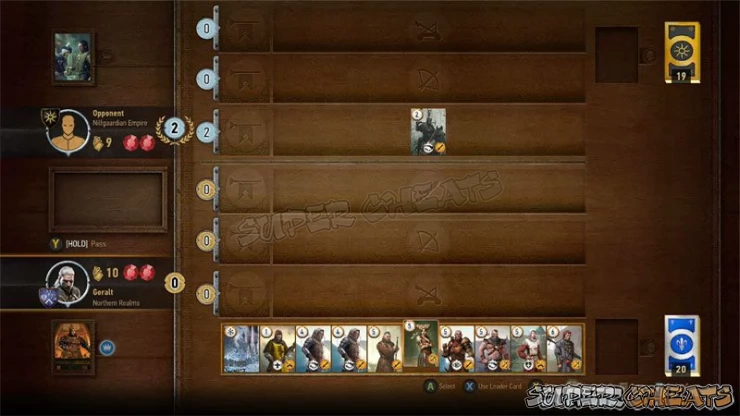
The Gwent Deck
There are four possible types of deck in Gwent - the Northern Realms, Nilfgaardian Empire, the Scoia’tael and Monsters.
Each deck has a unique Leader Card, plus Unit Cards, Special Cards, and Weather Cards. Lastly, the deck will have the following signature abilities.
Northern Realms: Receive one additional card every time you win a round.
Nilfgaard: Automatically win rounds that end in draws.
Scoia’tael: Choose which player begins a round.
Monsters: A random Unit Card is placed on the board following a round
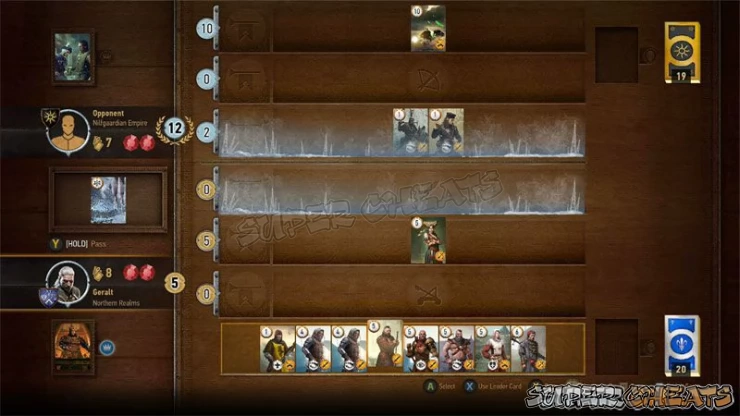
Gwent Card Types
Unit Cards: These are the backbone of the game, and are the cards where most of your Strength Points are found. There are three types of card in this category: Close, Ranged and Siege.
It is a very good idea to study and understand what each card does, because they really do have the power to alter the lay of the board and the power of the army.
Weather Cards: Fog disables Ranged Combat cards; Snow limits Close Combat cards; Rain interferes with Siege cards. You need to understand though that this works both ways - when you play a weather card it will impact YOU as well as the opponent.
Weather strategies are employed when, for example, you do not have Siege units to place - while your opponent does - so placing a Rain card will help you and hurt them.
Hero Cards: The strongest cards in a deck, the Hero is immune to Special Cards and often adds serious Strength to the game.
Neutral Cards: These cards boost the effects of other Gwent cards on the board.
Leader Cards: The commander of your deck, your Leader has a special ability that you can use once in each game. You can actually make your deck's Leader stronger over time by purchasing or looting the related cards.
Special Cards: These cards will alter - or increase - the ability and strength of other cards on the board.
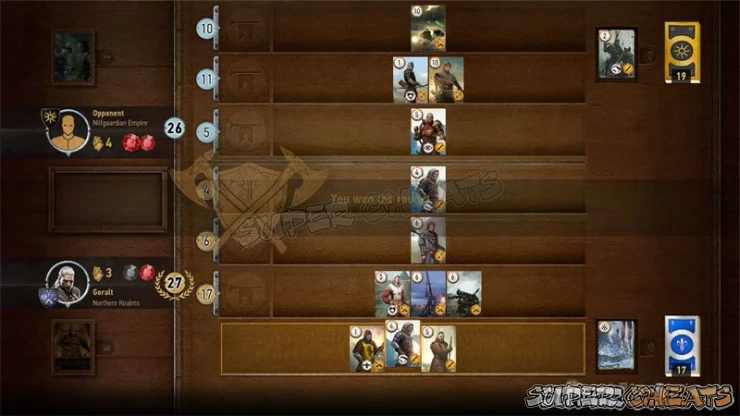
The Wild Cards
While almost every card in the game is important, just like the animals in the farm, some are more equal than others and some, well, some are very useful and this is about those ones...
In the game of Gwent there are two cards that are known as the Wild Cards to veteran players - because when they are used in a hand they tend to have massive impact on that hand. The Wild Cards of Gwent are:
- Commander's Horn -- This card doubles the strength of all units in a given row. Effectively it turns each of the cards in that row into two of that card!
- Scorch -- This card destroys the highest value cards in play - but also destroys itself - so it is something of a Pyrrhic victory of sorts. That said, it does allow you to sort out your opponent when they play one of those nasty 10 pointers that you just know they are going to double with the Commander's Horn first chance they get!
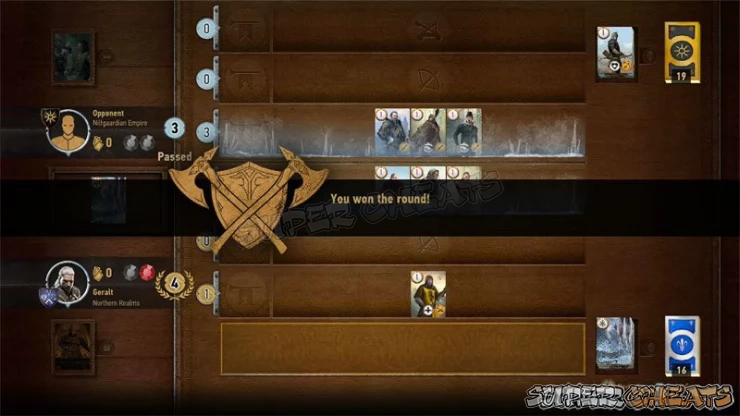
Tips and Strategies
Build and Shape your Deck: When you encounter a merchant that has cards to sell check them to see if they will improve your deck. If so, buy them!
When building and shaping your deck try not to have more than 22 or so Unit Cards. You want variety in the deck so that you get better draws and the other types are not so rare.
Even though you are limiting yourself to around 22 Unit Cards, you want the total Unit Strength to add up to at least 100 if not more. If it does not you need to improve on that!
Start Out Small: Use your lower point cards or at least do not bring out the big guns and especially ALL of the big guns in your hand in the first round!
Passing is not Bad... If you have more points on the board passing is actually good. Remember you only have 10 cards total and you do not want to play them all in one round because then you will lose the other rounds!
Weather Cards: Try to use them so that they hurt your opponent and help you.
Anything missing from this guide?
ASK A QUESTION for The Witcher 3: The Wild Hunt
 Join us on Discord
Join us on Discord

inn keep at kingfisher wont give up his card after I beat him over and over again.whats up cant advance in quest until he does.........
Excelente guide!
Thanks for all the great tips!
I'll recommend supercheats for sure!